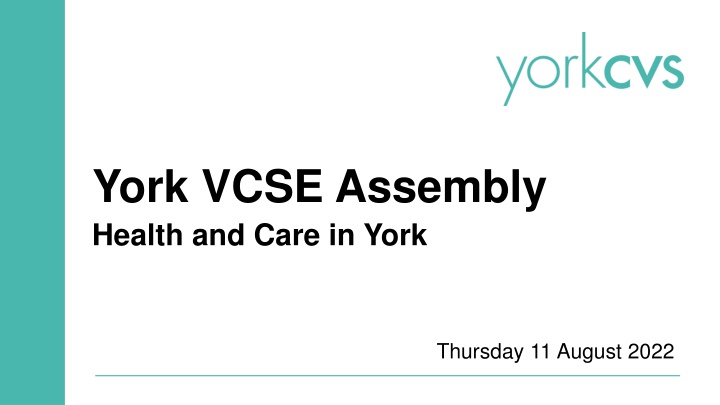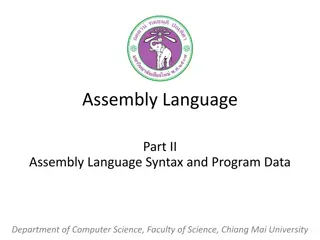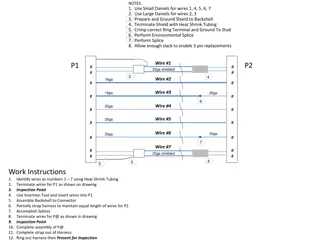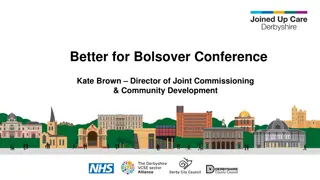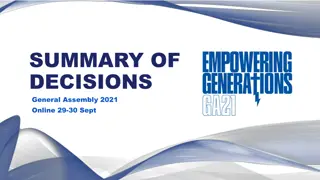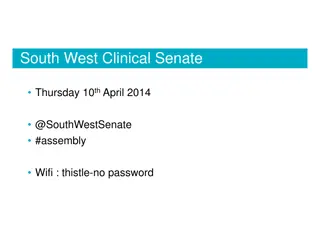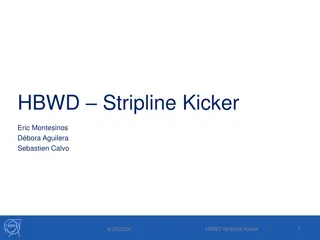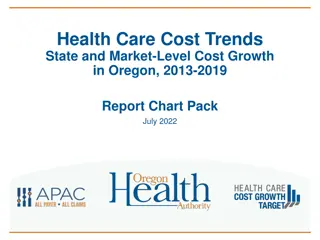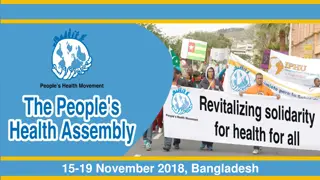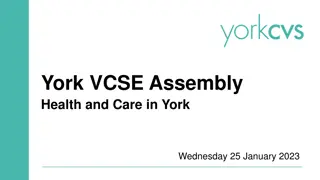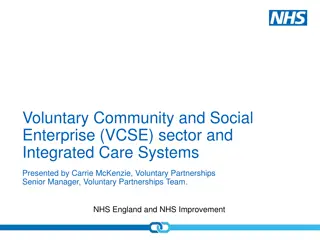York VCSE Assembly Health and Care in York
Stay informed about the York VCSE Assembly focusing on health and care in York. Join us on Thursday, 11 August 2022, to engage with key stakeholders, share insights, and collaborate towards improving health and social care services in the region.
Download Presentation

Please find below an Image/Link to download the presentation.
The content on the website is provided AS IS for your information and personal use only. It may not be sold, licensed, or shared on other websites without obtaining consent from the author.If you encounter any issues during the download, it is possible that the publisher has removed the file from their server.
You are allowed to download the files provided on this website for personal or commercial use, subject to the condition that they are used lawfully. All files are the property of their respective owners.
The content on the website is provided AS IS for your information and personal use only. It may not be sold, licensed, or shared on other websites without obtaining consent from the author.
E N D
Presentation Transcript
York VCSE Assembly Health and Care in York Thursday 11 August 2022
Welcome Alison Semmence Chief Executive, York CVS
UK Shared Prosperity Fund Partnership Board Second Meeting 15th July 2022
Feedback Received York St John (Marc Fleetham) Office of Police, Crime & Fire Commissioner (Sarah Arnott) York CVS/York Health Assembly (Alison Semmence) University of York (Amaada Selvaratnam) York Cultural Leaders Group (Helen Apsey) Make It York (Sarah Loftus) Aviva (Sally Dillon) York Environment Forum (Penny Bainbridge) Askham Bryan College (Tim Whitaker) DWP (Elaine Armstrong) York Learning (Paul Cliffe) YNY LEP (Andrew Leeming) York Museums Trust (Reyahn King) CYC Economic Growth CYC Regeneration & Housing CYC Skills Team CYC Communities Team CYC Community Safety Working together to improve and make a difference
UKSPF Theme Communities and Place Objectives (UK Government) Strengthening our social fabric and fostering a sense of local pride and belonging, through investment in activities that enhance physical, cultural and social ties and amenities, such as community infrastructure and local green space, and community-led projects. Building resilient, safe and healthy neighbourhoods, through investment in quality places that people want to live, work, play and learn in, through targeted improvements to the built environment and innovative approaches to crime prevention. Existing Strategies/Priorities/Partnerships (York) Community Hubs Health & Wellbeing Strategy (emerging) Police & Crime Plan Addressing Violence against Women and Girls Strategy Financial Inclusion Steering Group Initiatives Digital Inclusion Strategy My City Centre action plan Acomb Front Street plan
UKSPF Theme Supporting Local Business Objectives (UK Government) Creating jobs and boosting community cohesion, through investments that build on existing industries and institutions, and range from support for starting businesses to visible improvements to local retail, hospitality and leisure sector facilities. Promoting networking and collaboration, through interventions that bring together businesses and partners within and across sectors to share knowledge, expertise and resources, and stimulate innovation and growth. Increasing private sector investment in growth-enhancing activities, through targeted support for small and medium- sized businesses to undertake new-to-firm innovation, adopt productivity enhancing, energy efficient and low carbon technologies and techniques, and start or grow their exports. Existing Strategies/Priorities/Partnerships (York) Economic Strategy (in draft) Covid recovery plan and partnership working Economic Partnership (emerging) Business Leaders Group York & North Yorkshire LEP and plans
UKSPF Theme People and Skills Objectives (UK Government) Existing Strategies/Priorities/Partnerships (York) York Skills Plan 2020-2030 York Skills Board York & North Yorkshire LEP and strategies Boosting core skills and supporting adults with no or low level qualifications and skills in maths to progress in work, Reducing levels of economic inactivity through investment in bespoke intensive life and employment support tailored to local need. Join-up mainstream provision and local services for participants, through the use of one-to-one keyworker support, improving employment outcomes for specific cohorts who face labour market barriers. Supporting people furthest from the labour market to overcome barriers to work by providing cohesive, locally tailored support, including access to basic skills. Supporting local areas to fund gaps in local skills provision to support people to progress in work, and supplement local adult skills provision e.g. by providing additional volumes; delivering provision through wider range of routes or enabling more intensive/innovative provision, both qualification based and non- qualification based. This should be supplementary to provision available through national employment and skills programmes.
Communities based on Health & Wellbeing strategy, Community Hubs, +? Challenges Reducing poverty/ deprivation/ debt/ mitigating impacts of cost of living crisis Growing skills and employability Increasing volunteering Increasing community capacity/development Improving Health & wellbeing/addressing life expectancy gap Social isolation Growing mental health crisis Early intervention and prevention Opportunities Community Hubs Build on work through Ward Committees Funding for the Anti Racism Strategy Working Group Existing CRF Projects Social prescribing network
Place based on MyCityCentre, Acomb/Haxby studies Challenges How we maintain a vibrant city centre and increase/maintain the footfall to support shops, decrease empty buildings and create jobs How do we drive footfall and improve the vibrancy of the secondary shopping areas ie Acomb and Haxby, to enhance sustainability and economic growth. Counter Terrorism Security measures JCP Employment initiatives and the needs of retail and hospitality businesses and the visitor economy Opportunities Create or use exciting new spaces for families and cultural activities Make it simpler, cheaper and less disruptive to put on events in the city, and support more community led events Improve accessibility: more dropped kerbs, improved surfaces and seating and better facilities for disabled people; embed dementia and autism friendly standards In the secondary shopping areas, work with businesses to improve the public realm, increase awareness of the opportunities and potential impact of utilising the outdoor space adjacent to their businesses and install gateway signs Fund secure community infrastructure and crime reduction and create safe accessible community spaces
Supporting Local Business based on Economic Strategy Challenges Lack of direct support for businesses following ending of LCR Growth Hub funding through ERDF Mainstream business support focusses entirely on B2B models, leaving retail, hospitality and service businesses without support Absence of targeted sector support for high-value sectors such as rail, bio-tech, tech/digital and creative Lack of support for new businesses/start-ups Impacts of inflation, fuel prices and supply chain disruption Need for business involvement in climate change actions Absence of public support for businesses to address climate change impacts and carbon footprints Shortage of start-up and growth space Opportunities Strong HE/FE links through the Higher York partnership Supporting the BID to assist city centre businesses Neitwork of traders associations for individual areas Strengthening YNY Growth Hub model for York to join Good connections built with the business community through covid, with weekly bulletin going to c. 2,000 businesses across York and active business networks, with strong FSB and Chamber of Commerce membership Successful innovation utilising Covid grant moneys ARG voucher scheme model, small grants to foundation economy, big focus on micro businesses
People and Skills based on York Skills Plan Challenges Ageing population is leading to a lack of skills as people retire from the workforce more quickly and in larger numbers than people can be trained or recruited. Current models of training and employment do not always support people to fulfil their potential e.g. those with disabilities, low skills attainment, caring responsibilities, neurodiversity. Lack of employer engagement and understanding of benefits of training/skills support. The demand for digital skills at all levels outstrips supply. Lack of timely and localised Information, Advice and Guidance for inactives and those in work. Opportunities Existing work through third sector partners on ESF Pioneering partnerships putting businesses closer to the heart of skills planning. Community outreach providing a gateway to upskilling and reskilling opportunities. Growth in key sectors such as rail and construction with high demand for staff. Improve progression routes from entry level to higher level skills/training in priority sectors Technology offers innovation to traditional industries and opportunities for entrepreneurship among a wider group of people. Better align careers education information, advice and guidance with York s labour market
Interventions Community & Place E8: Funding for the development and promotion of wider campaigns which encourage people to visit and explore the local area. E9: Funding for impactful volunteering and/or social action projects to develop social and human capital in local places. E10: Funding for local sports facilities, tournaments, teams and leagues; to bring people together. E11: Investment in capacity building and infrastructure support for local civil society and community groups. E12: Investment in community engagement schemes to support community involvement indecision making in local regeneration. E13: Community measures to reduce the cost of living, including through measures to improve energy efficiency, and combat fuel poverty and climate change. E14: Funding to support relevant feasibility studies. E15: Investment and support for digital infrastructure for local community facilities. E1: Funding for improvements to town centres and high streets, including better accessibility for disabled people, including capital spend and running costs. E2: Funding for new, or improvements to existing, community and neighbourhood infrastructure projects including those that increase communities resilience to natural hazards, such as flooding. This could cover capital spend and running costs. E3: Creation of and improvements to local green spaces, community gardens, watercourses and embankments, along with incorporating natural features into wider public spaces. E4: Enhanced support for existing cultural, historic and heritage institutions that make up the local cultural heritage offer. E5: Design and management of the built and landscaped environment to design out crime . E6: Support for local arts, cultural, heritage and creative activities. E7: Support for active travel enhancements in the local area.
Interventions Supporting Local Business E16: Investment in open markets and improvements to town centre retail and service sector infrastructure, with wrap around support for small businesses. E17: Funding for the development and promotion (both trade and consumer) of the visitor economy, such as local attractions, trails, tours and tourism products more generally E18: Supporting Made Smarter Adoption: Providing tailored expert advice, matched grants and leadership training to manufacturing SMEs E19: Increasing investment in research and development at the local level. Investment to support the diffusion of innovation knowledge and activities and support the commercialisation of ideas E20: Research and development grants supporting the development of innovative products and services. E21: Funding for the development and support of appropriate innovation infrastructure at the local level. E22: Investing in enterprise infrastructure and employment/innovation site development projects. E23: Strengthening local entrepreneurial ecosystems, and supporting businesses at all stages of their development to start, sustain, grow and innovate, including through local networks. E24: Funding for new and existing training hubs, business support offers, incubators and accelerators for local enterprise which can support entrepreneurs and start-ups through the early stages of development and growth. E25: Grants to help places bid for and host international business events and conferences E26: Support for growing the local social economy, including community businesses, cooperatives and social enterprises. E27: Funding to develop angel investor networks nationwide. E28: Export Grants to support businesses to grow their overseas trading, supporting local employment. E29: Supporting decarbonisation and improving the natural environment whilst growing the local economy E30: Business support measures to drive employment growth, particularly in areas of higher unemployment. E31: Funding to support relevant feasibility studies. E32: Investment in resilience infrastructure and nature based solutions that protect local businesses and community areas from natural hazards including flooding and coastal erosion.
Interventions People and Skills E33: Employment support for economically inactive people: Intensive and wrap-around one-to-one support to move people closer towards mainstream provision and employment, supplemented by additional and/or specialist life and basic skills (digital, English, maths and ESOL) support where there are local provision gaps. E34: Courses including basic skills (digital, English, maths (via Multiply) and ESOL), and life skills and career skills provision for people who are unable to access training through the adult education budget or wrap around support detailed above. Supplemented by financial support for learners to enrol onto courses and complete qualifications E35: Activities such as enrichment and volunteering to improve opportunities and promote wellbeing. E36: Intervention to increase levels of digital inclusion, with a focus on essential digital skills, communicating the benefits of getting (safely) online, and in-community support to provide users with the confidence and trust to stay online. E37: Tailored support to help people in employment, who are not supported by mainstream provision to address barriers to accessing education and training courses. This includes supporting the retention of groups who are likely to leave the labour market early E38: Support for local areas to fund local skills needs. This includes technical and vocational qualifications and courses up to level 2 and training for vocational licences relevant to local area needs and high-value qualifications where there is a need for additional skills capacity that is not being met through other provision. E39: Green skills courses targeted around ensuring we have the skilled workforce to achieve the government s net zero and wider environmental ambitions. E40: Retraining support for those in high carbon sectors. E41: Funding to support local digital skills.
Outline Allocation by theme and year Community & Place Local People & Skills Admin costs (4%) Total Capital Revenue Businesses 250,000 250,000 95,049 0 24,794 619,843 64,464 555,379 2022-23 300,000 350,000 210,100 300,000 49,587 1,239,687 154,961 1,084,726 2023-24 500,000 400,000 718,061 1,500,000 129,919 3,247,980 581,388 2,666,592 2024-25 2,050,000 1,023,210 1,800,000 204,300 5,107,510 800,813 4,306,697 Total Working together to improve and make a difference
